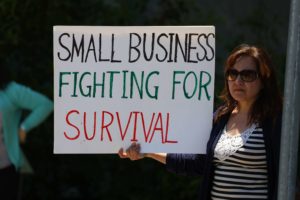Despite the recession, I’m happy to report that my small business in 2020 is not dead.
Last-minute virtual keynotes and coaching gigs mean that I’ll wind up in the green. But know this: you only need to earn $1 more than you spend to be profitable, and it’s about that close. And I’m not the only one. Friends and colleagues in the professional services business report that they’ll make it through 2020, but all bets are off for 2021.
•••
First of all, the costs of running a small business—or even participating in the gig economy—are underreported. I write in my book that it’s easy to say CUT EVERYTHING, but that’s harder to do. It’s $6 a month to have a branded email account and $150/year for a basic Zoom account. You think that’s nothing, but it adds up quickly. I recently downloaded a premium app that scans and faxes because multiple clients asked for contracts faxed even though I also pay for a Docusign account.
“Will a scanned document and email work?”
Nope, that’s not how they operate. Now my $4 is gone, and if I forget to cancel the app, it’s another $4 to teach me a lesson.
•••
The thing about small business owners is that we are learning junkies. That’s because we are creative, passionate risk-takers who see something that’s broken and think, “I can solve that problem.”
Restaurant owners can bring flavors to life and tell stories with food while also serving us nutritious meals. Dentists see broken customer experiences and offer a fresh take on exams and cleanings. And professional services firms look at broken and outdated ways of operating and think, “I can optimize that.”
What got us into the marketplace is our unbridled enthusiasm to change the world. What keeps us here is staying fresh with our skills—and one step ahead of our competitors—by regularly learning something new.
Learning doesn’t have to be expensive, but all the great business leaders have coaches. That’s not free. Small business owners invest in continuing education, courses, certificates, and opportunities to improve their competencies. And the time to invest in yourself is during a recession, like the one we’re having. So, my friends and I keep spending money on ourselves to make money, a classic logical fallacy but a necessary investment if we want to be around for 2021.
•••
The final expense I want to talk about is labor. Whether we have contractors or full-time employees, all business owners believe their word is their bond. When someone agrees to work with you, they’re saying, “I believe in your vision, and I bet my family’s wellbeing on it.”
You better believe we fight hard to earn and keep the trust of our workforce. I haven’t paid myself since my initial PPP traunch, but I haven’t missed a payment to the team around me. That’s because what got me here—doing it on my own, being cheap, fumbling through mistakes, explaining away my errors on my growth and lack of a supportive team around me—won’t get me to where I want to be in my career.
This year was supposed to be the year I got a new car and carried a zero-balance on my business credit card. Instead, this is the year when I socked away cash for 2021 and paid the people around me first. There should be an ATM in my office where people drive through, and I hand them stacks of twenties out my front window.
But, I’m happy to report my business credit card has no debt—a small victory in a stressful environment, but an important one. My old Volvo drives fine. I want to meet my long-term goals of riding off into middle-age with some dignity at the beach, I’ll continue to delay gratification.
•••
 Now that I’ve painted a bleak picture of small business, I have to say that I’m like Spanish terrorist/conquerer Hernán Cortés who arrived in Mexico with 600 men in 1519 and burned his boats.
Now that I’ve painted a bleak picture of small business, I have to say that I’m like Spanish terrorist/conquerer Hernán Cortés who arrived in Mexico with 600 men in 1519 and burned his boats.
There’s no going back, which means that my business needs to earn more than a few bucks in profitability in 2021. I’m bullish on the upcoming year, but the most important thing I can do is to normalize “talking about the fight to stay alive.”
I look around at all the successful consultants, authors, and content creators in my life and think, “I know you’re struggling. Why isn’t anybody talking or writing about this?” Even the ones with big books and platforms have seen their revenue projections tumble. Why doesn’t someone go first and share their story of running a small business in 2020?
Why don’t I go first?
Well, here I am. Maybe if enough of us get mad about what’s happened to small businesses in America, we can start to enact real and lasting change—what we promised to do with our companies and our voices in the first place.
You must be logged in to post a comment.